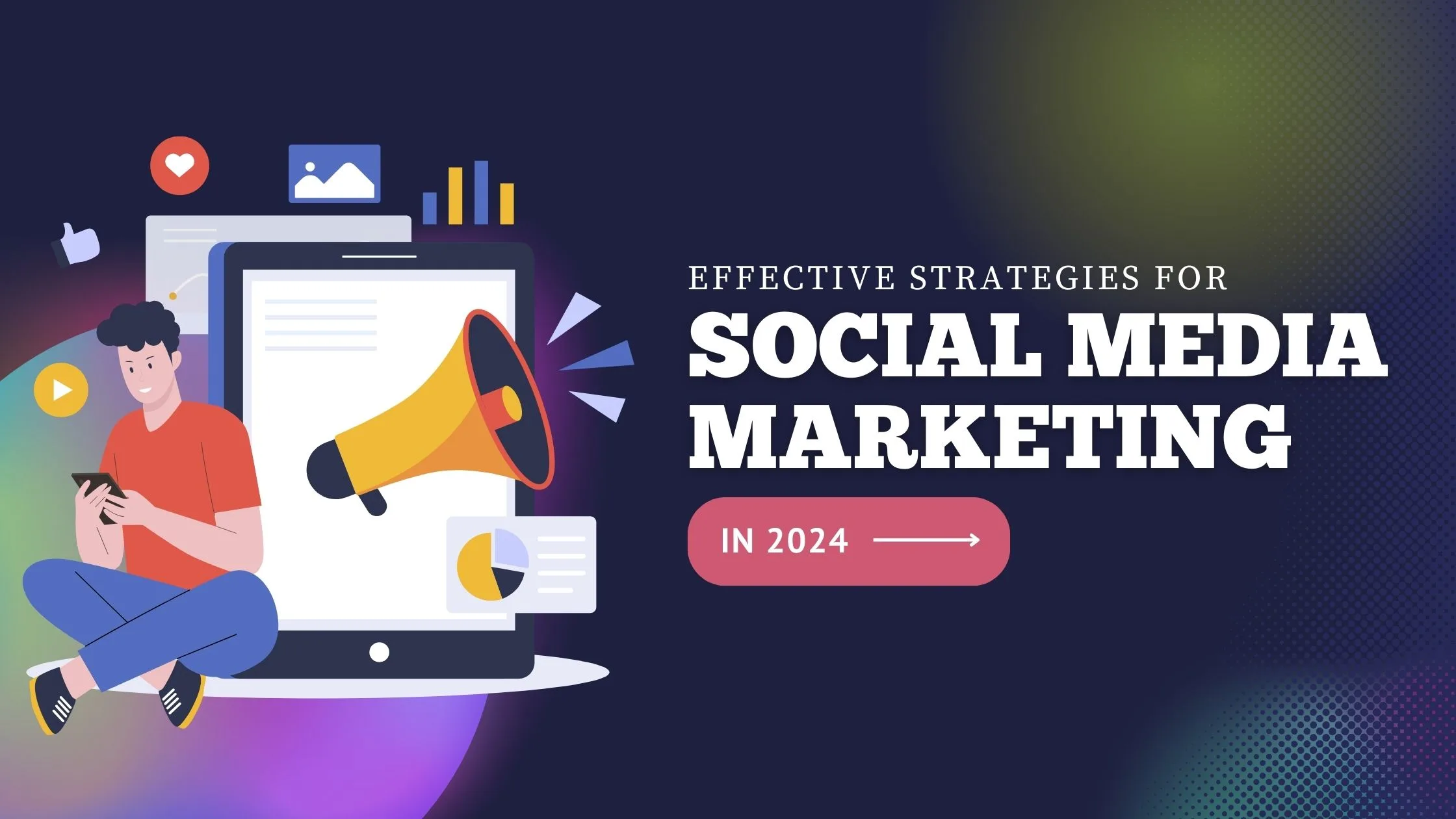Effective Strategies for Social Media Marketing in 2024
Are you ready to unlock the secrets of social media success in 2024? In this rapidly changing digital landscape, keeping up with the latest strategies and trends is crucial for businesses to stay ahead. Social media has become a powerful tool for marketers, allowing them to connect with their target audience on a personal level like never before. But what will make your brand stand out amidst all the noise? Join us as we dive deep into effective strategies for social media marketing in 2024, revealing insider tips and tricks that will skyrocket your online presence. From AI-powered chatbots to interactive live streams, get ready to revolutionize your social media game plan and see unparalleled growth in the year ahead. It’s time to future-proof your business and take charge of your online success – let’s get started!
Introduction: The importance of social media marketing in 2024
In today’s digital age, it is impossible to ignore the impact and relevance of social media. It has become an integral part of our daily lives, with over 3.8 billion people actively using social media platforms worldwide. This number is projected to grow even further by 2024, making it clear that social media marketing will continue to play a crucial role in business success.
Social media marketing refers to the use of various social media platforms such as Facebook, Instagram, Twitter, LinkedIn, and others to promote products or services and connect with potential customers. With the increasing popularity of these platforms among consumers, businesses have realized the importance of incorporating social media into their marketing strategies.
As we look towards the future, it is evident that social media marketing will only become more important for businesses. Here are some reasons why:
One significant advantage of using social media for marketing is its ability to reach a vast audience globally. As mentioned earlier, billions of people use these platforms every day, providing businesses with a massive pool of potential customers to tap into. Moreover, through advanced targeting options offered by various platforms like Facebook Ads Manager or LinkedIn Campaign Manager, businesses can tailor their advertisements to reach specific demographics based on factors such as age, location, interests, etc.
Current trends in social media marketing
Social media has become an integral part of our daily lives, with millions of people around the world using various platforms to connect, share and consume content. This immense popularity has made social media a powerful tool for businesses to reach and engage their target audience. As such, it is essential for businesses to stay updated on the latest trends and strategies in social media marketing to effectively promote their brand.
Here are some of the current trends in social media marketing that you should keep an eye on:
1. Influencer Marketing
Influencer marketing has been gaining traction over recent years as a highly effective strategy for brands to reach their target audience. It involves collaborating with popular and influential individuals on social media who have a large following and high engagement rates. These influencers can help create authentic and relatable content for your brand, thus building trust with their followers and potentially driving more sales.
2. Video Content Dominance
The rise of video content consumption has been one of the most significant trends in social media marketing. Platforms like Instagram, Facebook, TikTok, and YouTube have all prioritized video content over other forms due to its high engagement rates. Businesses are now leveraging this trend by creating visually appealing videos that capture attention quickly and convey their message effectively.
Understanding your target audience
1.Identifying Demographics: The first step in understanding your target audience is to identify their basic demographics such as age, gender, location, income level, education level, etc. This information will help you create a profile of your typical customer and tailor your social media marketing strategy accordingly.
2.Analyzing Interests: Once you have identified the demographics of your target audience, it is important to understand their interests and preferences. This can be done by conducting surveys or analyzing data from social media platforms. By knowing what topics or content they engage with the most, you can create targeted and relevant content that will resonate with them.
3. Understanding Behaviors: Another crucial aspect of understanding your target audience is to analyze their behavior on social media. This includes how often they use different platforms, what type of content they prefer consuming (images, videos, text), and when they are most active on these platforms. This information will help you schedule your posts at the right time and optimize them for maximum engagement.
4.Identifying Pain Points: To effectively connect with your target audience on social media, it is important to understand their pain points or challenges. What problems do they face? What are their needs and desires? By addressing these pain points through your content or products/services, you can build a strong connection with your audience and establish yourself as a solution provider.
Utilizing data and analytics to improve your strategy
In today’s fast-paced and data-driven world, it is crucial for businesses to utilize data and analytics in order to improve their social media marketing strategy. With the abundance of information available at our fingertips, it would be a wasted opportunity not to tap into this valuable resource.
By incorporating data and analytics into your social media marketing efforts, you can gain valuable insights about your target audience, their interests, behaviors, and preferences. This information can then be used to tailor your strategy in a way that resonates with your audience and drives better results.
To effectively utilize data and analytics for your social media marketing strategy, here are some key steps you should follow:
1. Define your goals: Before diving into any kind of data analysis, it is important to clearly define what you want to achieve through your social media marketing efforts. Whether it is increasing brand awareness, driving website traffic or generating leads – having a clear goal will help guide your analysis in the right direction.
2. Identify relevant metrics: Once you have defined your goals, the next step is to identify the key performance indicators (KPIs) that will help you measure progress towards those goals. These could include metrics such as engagement rates, reach, clicks or conversions depending on what matters most for achieving your objectives.
Choosing the Right Effective Social Media Marketing Platforms for Your Brand
When it comes to social media marketing, choosing the right platforms for your brand is crucial. With so many different social media channels available, it can be overwhelming to decide which ones are best suited for promoting your business. However, taking the time to carefully consider your target audience and your brand’s goals can help you narrow down the options and select the most effective platforms.
1. Define Your Target Audience
Before you even begin thinking about which social media platforms to use, it’s important to have a clear understanding of who your target audience is. This includes factors such as age, location, interests, and behaviors. By knowing who you want to reach, you can determine which platforms they are most likely to use and tailor your content accordingly.
For example, if your target audience is primarily young adults aged 18-24, then Instagram or Snapchat may be the best choices as these platforms are popular among this demographic. On the other hand, if you’re targeting working professionals in their 30s and 40s, LinkedIn or Twitter might be more suitable.
2. Consider Your Brand’s Goals
Every business has unique goals when it comes to social media marketing – whether it’s increasing brand awareness, driving website traffic, generating leads or sales. It’s essential to identify what your specific goals are before selecting which social media platforms will best help you achieve them.
Creating engaging and shareable content
In today’s digital age, social media has become an essential tool for businesses to connect with their target audience and promote their brand. With the rise of various social media platforms such as Facebook, Instagram, Twitter, and LinkedIn, creating engaging and shareable content has become crucial for a successful social media marketing strategy.
So how can you create content that not only captures the attention of your audience but also encourages them to share it with others? Here are some effective strategies for creating engaging and shareable content on social media:
1. Understand Your Target Audience:
Before you start creating content, it is essential to understand who your target audience is. What demographics do they belong to? What are their interests? What kind of content resonates with them? By understanding your target audience’s behavior and preferences, you can tailor your content accordingly.
2. Tell a Story:
Humans are naturally drawn towards stories. They evoke emotions and make us feel connected to the storyteller. Utilize this power of storytelling in your social media posts by creating narratives that engage your audience. Share behind-the-scenes glimpses of your business or highlight customer success stories that showcase the impact of your products or services.
3. Use Visuals:
Visuals have proven to be more attractive and memorable than plain text. Platforms like Instagram and Pinterest rely heavily on visual content, making it crucial for businesses to include eye-catching visuals in their social media posts.
Leveraging influencer partnerships
In today’s digital age, social media has become a vital tool for businesses to connect with their target audience and showcase their brand in front of millions. With the rise of influencer marketing, many brands are now leveraging partnerships with influential individuals on social media to reach a wider audience and increase their online presence. In this section, we will discuss the importance of influencer partnerships and how businesses can effectively leverage them for successful social media marketing.
1. What is Influencer Marketing?
Firstly, let’s define what influencer marketing is all about. It is a type of marketing strategy where brands collaborate with influential individuals on social media to promote their products or services. These individuals, also known as influencers, have a large following on various platforms such as Instagram, YouTube, or TikTok and possess the power to sway the purchasing decisions of their followers.
2. Why Partner with Influencers?
Partnering with influencers can bring numerous benefits to your business in terms of visibility, credibility, and increased conversions. As mentioned earlier, influencers have a dedicated following who trust their opinions and recommendations. When an influencer promotes your product or service on their platform, it can significantly increase brand awareness among their followers who could potentially turn into loyal customers.
Moreover, collaborating with influencers allows brands to tap into new audiences that they may not have reached through traditional advertising methods. Influencers often have a niche following that aligns with certain industries or interests which can help businesses target specific demographics more effectively.
Utilizing Paid Advertising on Social Media
In today’s digital age, social media has become an essential tool for businesses to reach and engage with their target audience. With the rise of various social media platforms such as Facebook, Instagram, Twitter, and LinkedIn, it has become increasingly important for businesses to utilize paid advertising on these channels to stay competitive in the market.
Paid advertising on social media refers to any form of promotional content that a business pays for on social media platforms in order to reach a wider audience. This can include sponsored posts, display ads, video ads, and more. These paid ads are designed to target specific demographics or interests and appear on users’ feeds or timelines.
One major advantage of utilizing paid advertising on social media is its highly targeted nature. Social media platforms have vast amounts of user data that can be used to create customized ad campaigns tailored towards a specific audience. This allows businesses to reach potential customers who are most likely interested in their products or services, increasing the chances of conversion.
Another benefit of using paid ads on social media is its cost-effectiveness. Traditional forms of advertising such as TV commercials or print ads can be expensive and may not always guarantee results. With paid social media advertising, businesses have more control over their budget and can choose how much they want to spend on each campaign.
Incorporating Interactive Features and Chatbots
In today’s digital age, effective social media marketing has become a crucial platform for businesses to reach and engage with their target audience. With the ever-increasing competition in the online space, it is important for brands to constantly innovate and find new ways to stand out from the crowd. One effective strategy that has gained significant popularity in recent years is incorporating interactive features and chatbots into social media marketing campaigns.
Interactive features, such as polls, quizzes, and games, allow businesses to create more engaging content that encourages active participation from their audience. These features not only make the content more interesting but also provide valuable insights into the preferences and behaviors of their target market. By utilizing these insights, businesses can tailor their future marketing efforts to better resonate with their audience.
Chatbots, on the other hand, are automated messaging systems that interact with users in a conversational manner. They are programmed to understand natural language and can be integrated into various social media platforms like Facebook Messenger or Twitter Direct Messages. Chatbots offer numerous benefits for businesses looking to enhance their social media marketing strategy.
Firstly, chatbots provide real-time customer service by responding instantly to inquiries or complaints from customers. This helps improve overall customer satisfaction as well as brand reputation. Secondly, they can assist in lead generation by capturing information from potential customers through conversations and directing them towards making a purchase or signing up for a service.
The Role of Video Content in Effective Social Media Marketing
In recent years, video content has become an increasingly popular and powerful tool in effective social media marketing . With the rise of platforms like YouTube, Instagram, TikTok, and Facebook Live, businesses have been able to reach a wider audience through engaging and visually appealing videos. In this section, we will explore the various ways in which video content plays a crucial role in social media marketing.
1. Increases Engagement
One of the main benefits of using video content in effective social media marketing is that it significantly increases engagement with your target audience. According to research by HubSpot, videos on social media generate 1200% more shares than text and images combined. This is because videos are more visually stimulating and tend to capture people’s attention faster than other forms of content.
Additionally, videos allow for more creativity and storytelling opportunities compared to static images or text posts. By creating compelling and entertaining videos that resonate with your target audience, you can create a stronger emotional connection with them and encourage them to engage with your brand.
2. Boosts Brand Awareness
With the ever-increasing competition on social media platforms, it can be challenging for businesses to stand out from the crowd. However, video content provides an excellent opportunity for brands to showcase their unique personality and differentiate themselves from their competitors.
Conclusion
As we look towards the future of social media marketing, it is clear that businesses must adapt and evolve to stay relevant in a constantly changing landscape. By implementing these effective strategies such as utilizing new platforms, creating engaging content, and utilizing influencer partnerships, companies can successfully reach their target audience and achieve their marketing goals. As technology continues to advance and consumer behaviors shift, staying up-to-date with the latest trends will be crucial for any business looking to succeed in social media marketing in 2024 and beyond.




